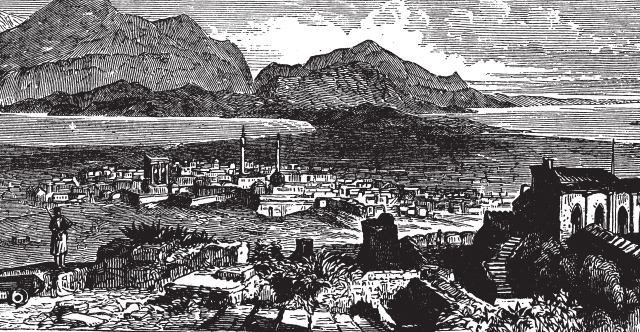
1
B
ut concerning things sacrificed to idols, we know, (for we all have knowledge: knowledge puffs up, but love edifies.
Now about food offered to idols: of course we know that all of us possess knowledge knowledge causes people to be puffed up (to bear themselves loftily and be proud), but love (affection and goodwill and benevolence) edifies and builds up and encourages one to grow.
2
I
f any one think he knows anything, he knows nothing yet as he ought to know.
If anyone imagines that he has come to know and understand much, he does not yet perceive and recognize and understand as strongly and clearly, nor has he become as intimately acquainted with anything as he ought or as is necessary.
3
B
ut if any one love God, he is known of him):
But if one loves God truly '> with affectionate reverence, prompt obedience, and grateful recognition of His blessing], he is known by God '> recognized as worthy of His intimacy and love, and he is owned by Him].
4
—
concerning then the eating of things sacrificed to idols, we know that an idol nothing in world, and that there no other God save one.
In this matter, then, of eating food offered to idols, we know that an idol is nothing (has no real existence) and that there is no God but one.
5
F
or and if indeed there are called gods, whether in heaven or on earth, (as there are gods many, and lords many,)
For although there may be so-called gods, whether in heaven or on earth, as indeed there are many of them, both of gods and of lords and masters,
6
y
et to us one God, the Father, of whom all things, and we for him; and one Lord, Jesus Christ, by whom all things, and we by him.
Yet for us there is one God, the Father, Who is the Source of all things and for Whom we, and one Lord, Jesus Christ, through and by Whom are all things and through and by Whom we.
7
B
ut knowledge not in all: but some, with conscience of the idol, until now eat as of a thing sacrificed to idols; and their conscience, being weak, is defiled.
Nevertheless, not all possess this knowledge. But some, through being all their lives until now accustomed to idols, still consider the food as that sacrificed to an god; and their weak consciences become defiled and injured if they eat.
8
B
ut meat does not commend us to God; neither if we should not eat do we come short; nor if we should eat have we an advantage.
Now food will not cause our acceptance by God nor commend us to Him. Eating gives us no advantage; neither do we come short or become any worse if we do not eat.
9
B
ut see lest anywise this your right itself be a stumbling-block to the weak.
Only be careful that this power of choice (this permission and liberty to do as you please) which is yours, does not become a hindrance (cause of stumbling) to the weak or overscrupulous.
10
F
or if any one see thee, who hast knowledge, sitting at table in an idol-house, shall not his conscience, he being weak, be emboldened to eat the things sacrificed to the idol?
For suppose someone sees you, a man having knowledge reclining at table in an idol’s temple, might he not be encouraged and emboldened if he is weak and uncertain, and eat what is for the purpose of idol worship?
11
a
nd the weak, the brother for whose sake Christ died, will perish through thy knowledge.
And so by your enlightenment (your knowledge of spiritual things), this weak man is ruined (is lost and perishes)—the brother for whom Christ (the Messiah) died!
12
N
ow, thus sinning against the brethren, and wounding their weak conscience, ye sin against Christ.
And when you sin against your brethren in this way, wounding and damaging their weak conscience, you sin against Christ.
13
W
herefore if meat be a fall-trap to my brother, I will eat no flesh for ever, that I may not be a fall-trap to my brother.
Therefore, if food is a cause of my brother’s falling or of hindering, I will not eat flesh forever, lest I cause my brother to be tripped up and fall and to be offended.
 English
English
 Albanian - Shqip
Albanian - Shqip
 Arabic - العربية
Arabic - العربية
 Bulgarian - Български
Bulgarian - Български
 Chinese - 汉语
Chinese - 汉语
 English - English
English - English
 French - Français
French - Français
 German - Deutsch
German - Deutsch
 Italian - Italiano
Italian - Italiano
 Māori - Te Reo Māori
Māori - Te Reo Māori
 Portuguese - Português
Portuguese - Português
 Romanian - Română
Romanian - Română
 Russian - Русский
Russian - Русский
 Somali - Af Soomaali
Somali - Af Soomaali
 Spanish - Español
Spanish - Español
 Ukrainian - Українська
Ukrainian - Українська
 Vietnamese - Tiêng Viêt
Vietnamese - Tiêng Viêt
 English
English
 Albanian - Shqip
Albanian - Shqip
 Arabic - العربية
Arabic - العربية
 Bulgarian - Български
Bulgarian - Български
 Chinese - 汉语
Chinese - 汉语
 English - English
English - English
 French - Français
French - Français
 German - Deutsch
German - Deutsch
 Italian - Italiano
Italian - Italiano
 Māori - Te Reo Māori
Māori - Te Reo Māori
 Portuguese - Português
Portuguese - Português
 Romanian - Română
Romanian - Română
 Russian - Русский
Russian - Русский
 Somali - Af Soomaali
Somali - Af Soomaali
 Spanish - Español
Spanish - Español
 Ukrainian - Українська
Ukrainian - Українська
 Vietnamese - Tiêng Viêt
Vietnamese - Tiêng Viêt
